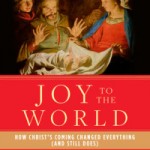B16 talked life, family, and natural law in Lebanon Saturday:
The wealth of any country is found primarily in its inhabitants. The country’s future depends on them, individually and collectively, as does its capacity to work for peace. A commitment to peace is possible only in a unified society. Unity, on the other hand, is not the same as uniformity. Social cohesion requires unstinting respect for the dignity of each person and the responsible participation of all in contributing the best of their talents and abilities. The energy needed to build and consolidate peace also demands that we constantly return to the wellsprings of our humanity. Our human dignity is inseparable from the sacredness of life as the gift of the Creator. In God’s plan, each person is unique and irreplaceable. A person comes into this world in a family, which is the first locus of humanization, and above all the first school of peace. To build peace, we need to look to the family, supporting it and facilitating its task, and in this way promoting an overall culture of life. The effectiveness of our commitment to peace depends on our understanding of human life. If we want peace, let us defend life! This approach leads us to reject not only war and terrorism, but every assault on innocent human life, on men and women as creatures willed by God. Wherever the truth of human nature is ignored or denied, it becomes impossible to respect that grammar which is the natural law inscribed in the human heart (cf. Message for the 2007 World Day of Peace, 3). The grandeur and the raison d’être of each person are found in God alone. The unconditional acknowledgement of the dignity of every human being, of each one of us, and of the sacredness of human life, is linked to the responsibility which we all have before God. We must combine our efforts, then, to develop a sound vision of man, respectful of the unity and integrity of the human person. Without this, it is impossible to build true peace.
He also made the case for religious freedom:
A pluralistic society can only exist on the basis of mutual respect, the desire to know the other, and continuous dialogue. Such dialogue is only possible when the parties are conscious of the existence of values which are common to all great cultures because they are rooted in the nature of the human person. This substratum of values expresses man’s true humanity. These values are inseparable from the rights of each and every human being. By upholding their existence, the different religions make a decisive contribution. It cannot be forgotten that religious freedom is the basic right on which many other rights depend. The freedom to profess and practise one’s religion without danger to life and liberty must be possible to everyone. The loss or attenuation of this freedom deprives the person of his or her sacred right to a spiritually integrated life. What nowadays passes for tolerance does not eliminate cases of discrimination, and at times it even reinforces them. Without openness to transcendence, which makes it possible to find answers to their deepest questions about the meaning of life and morally upright conduct, men and women become incapable of acting justly and working for peace. Religious freedom has a social and political dimension which is indispensable for peace! It promotes a harmonious life for individuals and communities by a shared commitment to noble causes and by the pursuit of truth, which does not impose itself by violence but rather “by the force of its own truth” (Dignitatis Humanae, 1): the Truth which is in God. A lived faith leads invariably to love. Authentic faith does not lead to death. The peacemaker is humble and just. Thus believers today have an essential role, that of bearing witness to the peace which comes from God and is a gift bestowed on all of us in our personal, family, social, political and economic life (cf. Mt 5:9; Heb 12:14).











